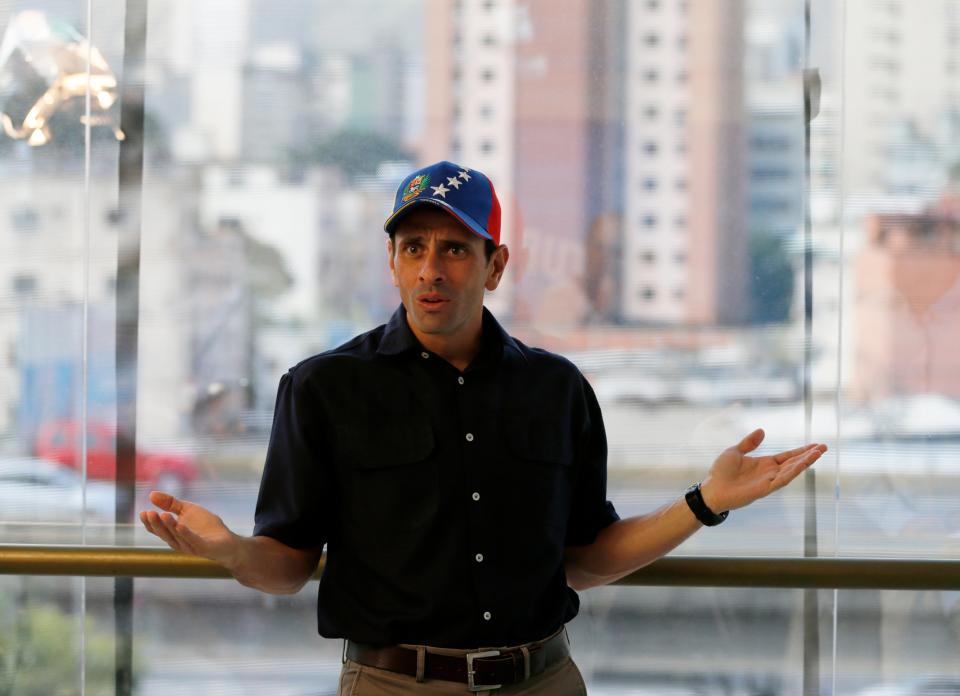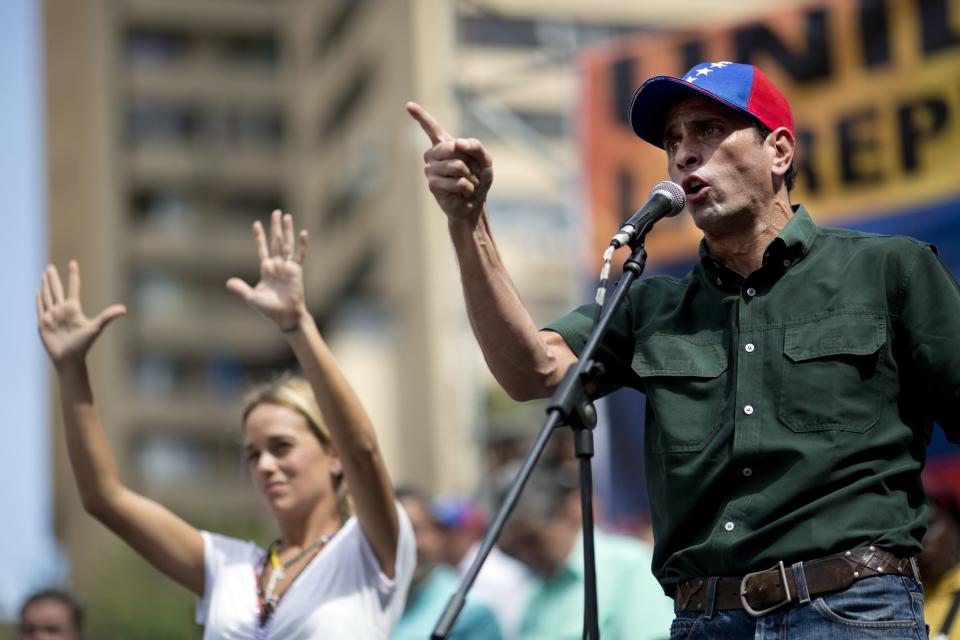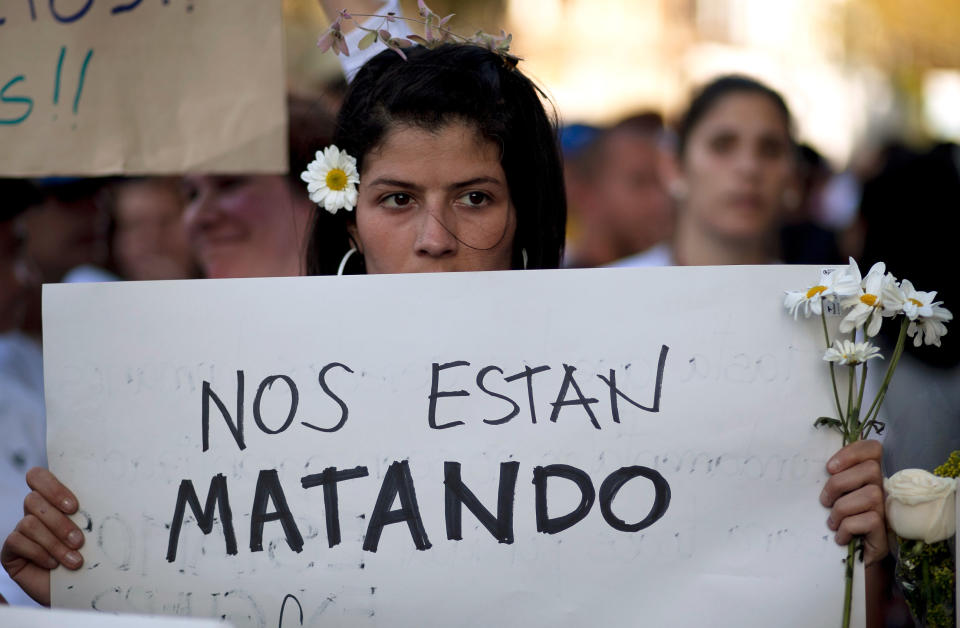Venezuela opposition struggles to expand appeal
CARACAS, Venezuela (AP) — It is hard to find toilet paper or flour in oil-rich Venezuela these days and the country is plagued by some of the highest inflation, murder and kidnapping rates in the world. Clashes between protesters and security forces loyal to the president have left 16 dead, and a telegenic opposition leader has been thrown in jail.
But don't expect a Ukraine-style street revolution anytime soon in this South American nation, where the frequently outmaneuvered opposition hasn't united behind a single strategy or managed to broaden its appeal beyond the largely middle-class, educated followers it's had on its side all along. The man they are up against, President Nicolas Maduro, has a near-complete grip on the military, broadcast media and institutions from congress to the judiciary after 15 years of socialist rule.
That could change if the protests continue and unrest gets further out of hand. But for many Venezuelans, the opposition's two highest profile leaders, former presidential candidate Henrique Capriles and the jailed Leopoldo Lopez, are still viewed as part of an elite detached from the working class life.
For years the opposition has insisted the government is illegitimate rather than succeeding in building bridges across class lines, reinforcing perceptions that it hasn't evolved since it backed a failed 2002 coup against then President Hugo Chavez.
"The opposition is always convinced that it's a majority and therefore it thinks that the government wins elections by fraud," said David Smilde, a senior fellow at the Washington Office on Latin America who spends part of the year conducting research in Caracas. But "it's a government that has considerable support."
Maduro's party handily won municipal elections in December that were seen as a referendum on his first year in office. An economic decline has accelerated since then, but he continues to funnel government resources into poor neighborhoods. While people there are suffering from the country's economic woes, they still feel little connection with the protesters they watch on television burning trash and setting up barricades in leafy neighborhoods that they could never aspire to live in.
On top of that, the two men leading the opposition haven't been able to agree on a strategy.
Capriles has come closest to expanding the base by reaching out to Chavez backers, promising to protect the revolution's social gains. That brought him within 225,000 votes of winning the election in April to choose a successor to the late Chavez.
But he's been pushed from that path by Lopez, leader of a smaller opposition party, who seized on this month's student-led protests to call even more people into the streets, a move that landed him in jail charged with arson and incitement. That has forced Capriles and other opposition figures to rally behind him.
Capriles conceded the demonstrations may have strengthened Maduro's hand in the short term by distracting Venezuelans from their daily frustrations and giving him a convenient scapegoat on which to blame a coming economic crisis caused by heavy-handed government policies.
Indeed, Maduro has trained state-run television cameras on the barricades of trash and furniture erected by the opposition.
"Now they want to blame me if there are shortages, but they are the ones who don't let through the trucks with rice, grains, milk and flour," Maduro said at a rally on Tuesday with employees of the state telephone company. "The rest of the country is like you all, working, studying."
To be sure, there are some signs that unrest is spreading to at least a few working-class neighborhoods around the country, even if most have remained calm despite the protests in tonier districts.
"How is it possible that there are food shortages, that my husband who worked (with an automotive company) ended up without a job?" said Adriana Suarez, a homemaker who banged a pot in protest Wednesday outside her house in a working-class neighborhood of Valencia, an industrial city about 170 kilometers west of Caracas with an opposition mayor.
She complained that the state supermarkets have food, but are only open to government supporters, while private ones have bare shelves.
While Chavez did some good things, the economic mess he left behind can't go on, she said. "We want a change."
That sentiment, and widespread expectations that the country's economic situation will only worsen in coming months, means there will be more opportunities for the opposition.
"These political protests have to connect with social concerns to build an organization that has strength and broad reach," Capriles said in an interview this week with The Associated Press. "Otherwise weariness will set in."
That more inclusive message, focused on the shared economic hardship and crime, was echoed this week by Lopez's wife, Lilian Tintori, who has been leading protests in the capital in between visits with her jailed husband.
"These have been difficult times for everyone in Venezuela," Tintori said. "The working class, the middle class, the wealthy, we have all faced the same problems, the crime, the kidnapping, the food shortages ... It hits us all."
But Luis Vicente Leon, director of Caracas-based pollster Datanalisis, said the opposition hasn't convinced the poor that it's capable of governing in their interests.
"They (the poor) are not going to get out in the street to do anything if they don't feel there is an alternative (to the government)," Leon said.
___
Associated Press writers Joshua Goodman in Caracas and Ezequiel Abiu Lopez in Valencia contributed to this report.






